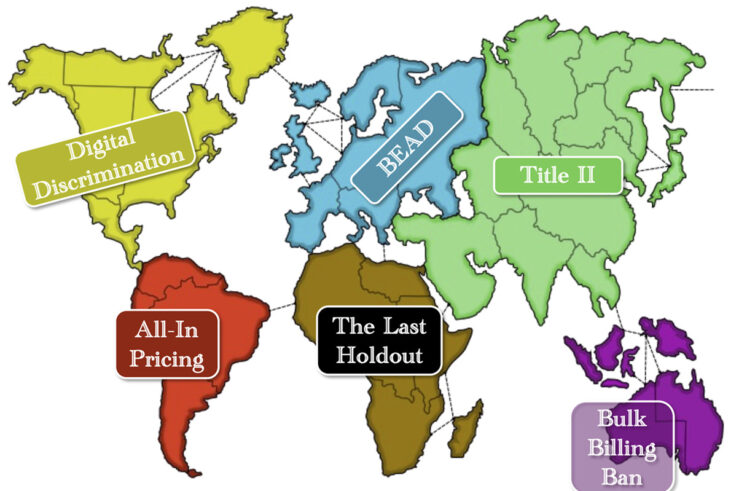The U.S. Federal Trade Commission’s (FTC) well-recognized expertise in assessing unfair or deceptive acts or practices can play a vital role in policing abusive broadband practices. Unfortunately, however, because Section 5(a)(2) of the FTC Act exempts common carriers from the FTC’s jurisdiction, serious questions have been raised about the FTC’s authority to deal with unfair or deceptive practices in cyberspace that are carried out by common carriers, but involve non-common-carrier activity (in contrast, common carrier services have highly regulated terms and must be made available to all potential customers).
Commendably, the Ninth Circuit held on February 26, in FTC v. AT&T Mobility, that harmful broadband data throttling practices by a common carrier were subject to the FTC’s unfair acts or practices jurisdiction, because the common carrier exception is “activity-based,” and the practices in question did not involve common carrier services. Key excerpts from the summary of the Ninth Circuit’s opinion follow:
The en banc court affirmed the district court’s denial of AT&T Mobility’s motion to dismiss an action brought by th Federal Trade Commission (“FTC”) under Section 5 of the FTC Act, alleging that AT&T’s data-throttling plan was unfair and deceptive. AT&T Mobility’s data-throttling is a practice by which the company reduced customers’ broadband data speed without regard to actual network congestion. Section 5 of the FTC Act gives the agency enforcement authority over “unfair or deceptive acts or practices,” but exempts “common carriers subject to the Acts to regulate commerce.” 15 U.S.C § 45(a)(1), (2). AT&T moved to dismiss the action, arguing that it was exempt from FTC regulation under Section 5. . . .
The en banc court held that the FTC Act’s common carrier exemption was activity-based, and therefore the phrase “common carriers subject to the Acts to regulate commerce” provided immunity from FTC regulation only to the extent that a common carrier was engaging in common carrier services. In reaching this conclusion, the en banc court looked to the FTC Act’s text, the meaning of “common carrier” according to the courts around the time the statute was passed in 1914, decades of judicial interpretation, the expertise of the FTC and Federal Communications Commission (“FCC”), and legislative history.
Addressing the FCC’s order, issued on March 12, 2015, reclassifying mobile data service from a non-common carriage service to a common carriage service, the en banc court held that the prospective reclassification order did not rob the FTC of its jurisdiction or authority over conduct occurring before the order. Accordingly, the en banc court affirmed the district court’s denial of AT&T’s motion to dismiss.
A key introductory paragraph in the Ninth Circuit’s opinion underscores the importance of the court’s holding for sound regulatory policy:
This statutory interpretation [that the common carrier exception is activity-based] also accords with common sense. The FTC is the leading federal consumer protection agency and, for many decades, has been the chief federal agency on privacy policy and enforcement. Permitting the FTC to oversee unfair and deceptive non-common-carriage practices of telecommunications companies has practical ramifications. New technologies have spawned new regulatory challenges. A phone company is no longer just a phone company. The transformation of information services and the ubiquity of digital technology mean that telecommunications operators have expanded into website operation, video distribution, news and entertainment production, interactive entertainment services and devices, home security and more. Reaffirming FTC jurisdiction over activities that fall outside of common-carrier services avoids regulatory gaps and provides consistency and predictability in regulatory enforcement.
But what can the FTC do about unfair or deceptive practices affecting broadband services, offered by common carriers, subsequent to the FCC’s 2015 reclassification of mobile data service as a common carriage service? The FTC will be able to act, assuming that the Federal Communications Commission’s December 2017 rulemaking, reclassifying mobile broadband Internet access service as not involving a common carrier service, passes legal muster (as it should). In order to avoid any legal uncertainty, however, Congress could take the simple step of eliminating the FTC Act’s common carrier exception – an outdated relic that threatens to generate disparate enforcement outcomes toward the same abusive broadband practice, based merely upon whether the parent company is deemed a “common carrier.”




